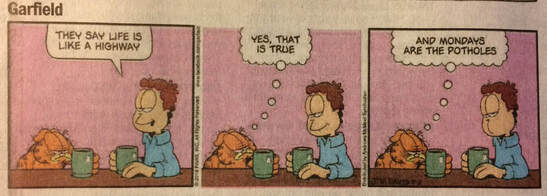Even those of us (I include myself) who, much of the time, actually get (got) some pleasure from the work we do (did), seem to have at least a little harder time getting up and moving on Mondays. There’s really no rational reason to explain this except that Monday follows Sunday, and Sunday is, for a great many people, at least slightly less hectic and frantic than the “typical” working day. I think that’s a fairly weak excuse, but it could be all that’s necessary to explain this phenomenon. Anyway, the great “beatnik” novel I was going to write, which was going to set a new mark for literary brilliance on the model of Kerouac’s On the Road, is still waiting to produce even the beginnings of an outline of chapter one, but it DID have a title. That title was the name of this post: “Mondays Is a Hard Time.”
In any event, over the years, especially since I have retired and started writing these posts, back in 2014, I have made a habit of looking at the comics in the daily paper and watching email and web stuff for pictures, signs, comics, etc., which relate to various ideas which interest me. I’ve also noticed that Mondays don’t seem to be all that much of a problem to me anymore, but that the “Mondays Is a Hard Time” notion has occasionally surfaced into what I laughingly refer to as my conscious mind. Probably MOST often the strip which has occasioned that surfacing has been Jim Davis’ strip, Garfield, although occasionally something different (comic strip, poster, etc.) seems to catch the spirit of Monday pretty well. Garfield, however, perhaps because he is a cat, seems to have a greater than usual aversion to Mondays, so it is that strip which is most likely to bring the phrase to mind.
In any case, I thought I would try to get a post out of some of the material I have collected, especially since the school year is starting to get under way, which suggests that the “Monday” phenomenon will soon be even more common than usual across the country and reminds me that I DON’T have to be concerned about that anymore! I’ll admit that I ALMOST miss it, but every time that starts to happen, I remember all of those early morning meetings and eight o’clock classes, which makes it easier not to miss the start of school very much. Anyway, here’s some, hopefully amusing samples of things I have collected about Mondays (if that’s possible)!
This isn’t from Garfield, but from Pearls Before Swine by Stephan Pastis. However I think it captures the Monday problem pretty well, especially if you have a “helpful” spouse, roommate, or “friend.”
This one goes back several years, before I discovered how to find strips I liked online, so I had to take a picture of it from the newspaper. I do think it captures the overall “essence” of Mondays quite well.
I have to admit that, while I don’t take advantage of it very often, being retired has the advantage (rather like that of being a pampered house cat) of not actually HAVING to get up if I don’t want to do so. Of course, being old tends to come with the need to take pills at various times of day, etc., so I really CAN’T just sleep in until I choose to drag myself out of bed. On the other hand, I AM somewhat likely to take an afternoon nap, an idea which I have learned from my cats, which probably does nothing to explain the strip below, but I DO understand the motivation behind it.
I think that’ll do it for this time. I expect I’ll be back in a couple of weeks, “If the good Lord’s willin’ and the creek don’t rise,” as they say. On the other hand, between the recent floods in some parts of the country, the drought in other parts, and the wild fires elsewhere, who can predict what the situation will be by then. I do PLAN to be back about then, though.
Anyway, until next time,
🖖🏼 LLAP,
Dr. B
“There can be no keener revelation of a society’s soul than the way in which it treats its children.”
— Nelson Mandela
“Words are, in my not-so-humble opinion, our most inexhaustible source of magic; capable of both inflicting injury, and remedying it.”
― Albus Dumbledore, Harry Potter and the Deathly Hallows






 RSS Feed
RSS Feed